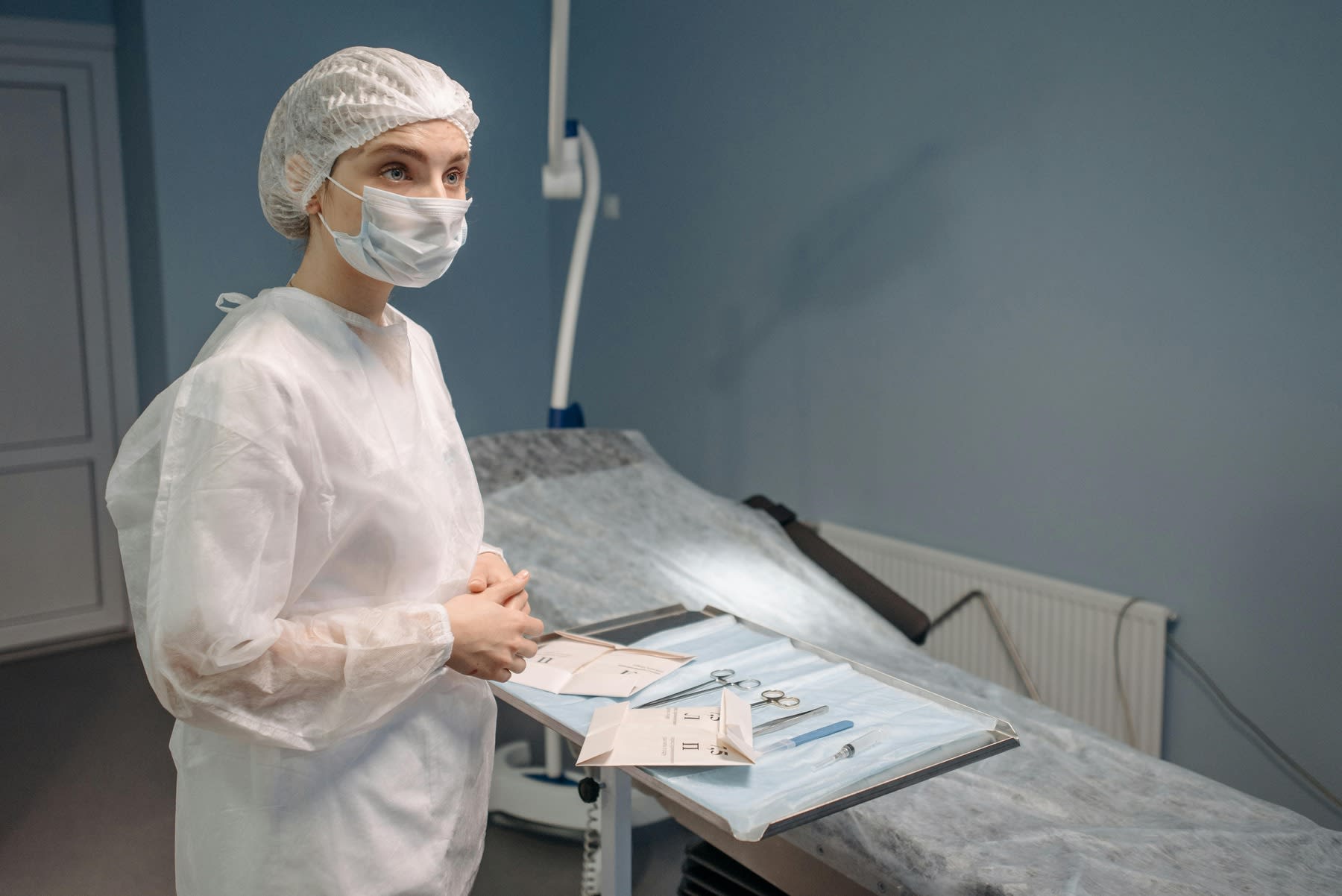How to Become a Nurse Anesthetist

Key Takeaways
- To become a nurse anesthetist, students must obtain a bachelor’s degree in nursing, pass the National Council Licensure Examination for RNs, and gain critical care experience.
- Students must then complete a doctorate and take the National Certification Examination.
- To be successful as a nurse anesthetist, graduates need critical thinking, problem-solving skills, good communication, and time management skills.
Without a clear understanding of the necessary steps and qualifications, aspiring nurse anesthetists may find themselves underprepared for the rigorous educational and certification requirements of this job. Our educational consultants have created this guide on how to become a nurse anesthetist to help you pursue this challenging yet rewarding career successfully.

How to Become a Nurse Anesthetist
To become a nurse anesthetist, you must obtain a bachelor’s degree in nursing to pass the National Council Licensure Examination for RNs and gain critical care experience. Next, you will have to complete a doctorate before taking up the National Certification Examination. You must also earn an Advanced Practice RN license and maintain your CRNA certification and license.
Armed with the knowledge and skills acquired through rigorous nurse anesthetist training and certification, you will be well-equipped to make a meaningful impact on patients’ lives. Here’s a list of steps you need to take to start your career as a certified registered nurse anesthetist.
| Steps | Actions to Take |
|---|---|
| Obtain undergraduate and graduate degrees | Complete a Bachelor of Science in Nursing (BSN) program and a Master of Science in Nursing (MSN) program |
| Become an RN | Pass the National Council Licensure Examination for Registered Nurses (NCLEX-RN) to become a licensed registered nurse (RN) |
| Gain relevant experience and soft skills | Work as an RN, typically in a critical care setting such as an intensive care unit (ICU), for at least one year to gain relevant experience |
| Complete a doctorate | Finish a Doctor of Nursing Practice (DNP) or Doctor of Nurse Anesthesia Practice (DNAP) program |
| Prepare for the NCE | Pass the National Certification Examination (NCE) |
| Earn an advanced practice RN license | Obtain an Advanced Practice Registered Nurse (APRN) license in your state |
| Continue your education and build your network | Maintain your CRNA certification and license by completing continuing education credits and renewing your certification and licensure |
Obtain Bachelor’s and Master’s Degrees
To become a CRNA, you’ll first need to complete your primary nurse anesthetist education, consisting of a bachelor of science in nursing diploma, followed by a master’s degree.
Bachelor’s Degree
A bachelor’s degree in nursing typically takes four years to complete, equipping you with the necessary nursing skills and knowledge in aspects like anatomy, physiology, microbiology, and other health sciences.
We found several affordable online bachelor’s of nursing programs, which help you save on indirect costs like transportation and room and board.
Master’s Degree
Completing an MSN degree may take two to three years, depending on your chosen program, prerequisites, and preferred specialty. You can finish this earlier if you study full-time.
This degree level provides specialized knowledge in anesthesia. Supervised clinical hours may depend on the nurse anesthetist program.
Accelerated Bachelor’s to Master’s
We understand that some aspiring CRNAs may have less time to complete their education, partly because of their responsibilities and the need to work while studying. To students in this situation, we recommend enrolling in an accelerated online master’s of nursing program to earn an advanced nursing degree in two years or less.
These programs combine BSN and master’s curricula. They are also ideal for non-nursing undergraduates who want to switch careers and enter the workforce sooner.
Pass the National Council Licensure Examination for RNs
To become a nurse anesthetist, you must meet the passing standards of the NCLEX-RN exam. This test is a must for anyone who wants to be a registered nurse in the United States. It verifies if you’re ready to provide safe and effective care with the exam covering several categories:
- Safe and effective care environment: This section is about creating and maintaining a safe hospital or clinic setting.
- Health promotion and maintenance: It tests your knowledge of how to help people stay healthy.
- Psychosocial integrity: Here, you’ll understand how to care for patients’ emotional and mental health needs.
- Physiological integrity: This part asks questions about the body’s functions and nursing care.
You can expect the exam to take about five hours. During this time, you’ll answer a variety of questions to show you know how to care for patients well. Here are some tips for tackling the NCLEX-RN exam:
- Start preparing early, and give yourself plenty of time to study.
- Understand the format since the test uses mostly multiple-choice questions.
- Practice with sample questions to help you get used to the types of questions on the test.
- Stay calm on test day, remember to breathe, and think carefully before answering.
Passing the NCLEX-RN is a big step towards your dream of becoming a nurse anesthetist. So take it seriously, study hard, and you’ll be on your way to a rewarding career in nursing anesthesiology.

Gain Relevant Experience
Nurse anesthetist is one of the best specializations for BSN students. However, you must first gain the necessary clinical experience to advance into anesthesiology.
In your nursing career, you’ll encounter different settings where your anesthesiology expertise is vital. You might work in hospitals, outpatient surgery centers, or assist in medical offices for various specialists, such as dentists and ophthalmologists.
The field constantly evolves with emerging technologies and new techniques, which means your nurse anesthetist education does not truly stop. You’ll also have the opportunity to bring vital anesthesia services to areas and settings that may be lacking them, expanding access to healthcare.
Critical Care Units
In pursuing a CRNA career path, you’ll need to gain experience in specialized areas where patients with serious medical conditions receive care. As a nurse anesthetist, working in these units, you will play a vital role in managing emergencies and providing complex care.
Intensive Care Unit (ICU)
- Caters to critically ill patients
- Requires constant monitoring and interventions
- Involves using advanced medical equipment
Cardiac Care Unit
- Requires safe and efficient administration of anesthesia and pain management
- Focuses on patients with heart issues
- Provides close monitoring and immediate treatment for cardiac conditions
Emergency Room (ER) Settings
- Place for immediate treatment of a wide range of emergencies
- Often the first point of care for critical cases
- Fast-paced environment requiring quick, decisive action
Anesthesiology and Pain Management
Nurse anesthetists are specially trained nurses who work with patients to make sure they are comfortable and pain-free during medical procedures. Here are some key tasks you’ll need to perform and have experience with:
- Pre-procedure: Before a procedure, you’ll evaluate a patient’s medical history and choose the appropriate anesthesia plan.
- During surgery: You’ll administer anesthesia and closely monitor the patient’s vital signs, adjusting as needed to maintain safety.
- Post-procedure: After surgery, you will continue to manage the patient’s pain as they recover, balancing their comfort with safety.
Develop the Necessary Qualities for Healthcare Professionals
Becoming a nurse anesthetist requires more than just technical knowledge. It’s important to hone specific skills and personal qualities that are vital in the healthcare field. These competencies will help you respond effectively to the challenges of the profession and provide exceptional care to patients.

Critical Thinking and Problem-Solving Skills
Critical thinking allows you to make informed decisions and solve problems quickly. Incorporating critical thinking into your nursing practice improves patient outcomes while also enhancing your professional development.
- Analyzing data: Review and interpret information accurately to make evidence-based decisions.
- Making judgments: Evaluate the pros and cons of different solutions for patient care.
- Being resourceful: Develop innovative solutions in critical situations.
Communication and Ethical Practice
Effective communication is part of ethical healthcare practice. By developing strong communication skills, you demonstrate respect and responsibility, key elements of ethical nursing practice.
- Verbal communication: Speak clearly and confidently with patients, families, and colleagues.
- Written communication: Document patient information and treatment plans precisely.
- Ethical considerations: Maintain patient confidentiality and obtain informed consent.
Time Management and Collaborative Outlook
Time management is critical when minutes can mean saving a life. Working well with others also plays a significant role.
- Prioritizing tasks: Focus on the most critical tasks first and learn how to quickly assess patient needs.
- Delegating responsibilities: Understand the strengths of your colleagues and when to delegate tasks to them.
- Team collaboration: Engage with your healthcare team to provide cohesive patient care.
Complete a Doctorate (DNP or DNAP)
After earning your BSN and gaining experience in the nurse anesthesiology field, you’ll need to complete a doctorate to become a CRNA. You have two options: A Doctor of Nursing Practice (DNP) or a Doctor of Nurse Anesthesia Practice (DNAP).
Your doctorate will involve coursework, clinical practice, and a final project or research. Courses cover topics like pharmacology, physiology, and anesthesia techniques. Clinical practice provides hands-on experience under the guidance of experienced CRNAs or anesthesiologists.
Consider accelerated online DNP programs that help students graduate faster than traditional programs while still focusing on clinical practice. These prepare you for leadership roles in nursing and incorporate evidence-based practice into care. Meanwhile, DNAP may emphasize the anesthesia specialty and include coursework on the delivery of anesthesia and pain relief.
Pass the National Certification Examination
After getting your doctorate, you can now take the National Certification Examination to receive the initial certification from the National Board of Certification and Recertification for Nurse Anesthetists (NBCRNA).
This exam measures your knowledge, skills, and abilities necessary for entry-level nurse anesthesia practitioners. Here’s what you need to know about the NCE:
- Eligibility: You can sit for the NCE upon completion of your nurse anesthesia educational program. Make sure your coursework and clinical hours are completed.
- Format: The NCE is a variable-length computerized adaptive test, which means the number of questions varies depending on your answers.
- Scoring: The passing standard is set to make sure that you have the required level of knowledge and skill.
Earn Advanced Practice RN Licensure
After completing your education and getting your initial nurse anesthetist certification, the next step is to obtain your Advanced Practice Registered Nurse (APRN) licensure. Here’s a basic outline of what to expect:
- Application: Submit an application to the state board where you plan to practice. Each state might have slightly different APRN requirements, so it’s important to check with your state’s board of nursing.
- Credentials: Provide proof of your education and RN licensure. You might also need to provide details of your clinical experience.
- Certification exam: Successfully pass the CRNA certification exam.
- Fees: Pay any applicable fees that your state board requires for licensure.

Continue Your Education to Maintain Your CRNA Certification and License
After becoming a CRNA, you’ll need to stay up-to-date with the latest in anesthesia care and practice by participating in continuing education (CE). Remember, continuing education is not just about meeting the requirements of a nursing major. It’s also about growing professionally and providing the best care possible to your patients.
CE is important because medical practices continuously improve. CE helps you keep up with these changes. The NBCRNA requires CRNAs to engage in regular CE activities to stay certified. Aside from that, state nursing boards also require CE for license renewal.
Here are the tips we share with CRNAs to fulfill their CE requirements:
- Make sure the CE credits you earn are recognized by the NBCRNA.
- Keep a lookout for CE opportunities in various formats, such as online modules or in-person seminars.
- Earn a certain number of credits within a set time frame.
- Use CE events to network with other CRNAs and healthcare professionals.
Build a Strong Professional Network
Building a strong professional network can contribute to your growth and success as a nurse anesthetist. It can open doors to leadership opportunities and increase your autonomy in the healthcare field.
Become a member of the American Association of Nurse Anesthesiology (AANA) to get access to specialized educational resources. Here, you can also connect with experienced nurse anesthetists as you attend national conferences and local meetings.
We also recommend participating in local chapters to engage with nearby professionals and stay informed about regional issues affecting your field. Develop relationships where you can both mentor and be mentored. Use your voice within these networks to advocate for greater autonomy and improvements in healthcare delivery.
Related Questions
How Fast Can You Become a Nurse Anesthetist?
Becoming a nurse anesthetist typically involves a commitment of at least eight years. You’re looking at four years for a BSN, followed by at least two years of clinical experience. A doctorate could take another three years, and factor in time for certifications and licensure.
How Much Do Certified Registered Nurse Anesthetists Make?
CRNAs are among the highest-paid nursing professionals, with an average annual salary of $203,090 and an impressive hourly wage of $97.64. However, your earning potential still depends on your experience, specialized skills, and location.
What Are the Career Opportunities for Nurse Anesthetists?
As a nurse anesthetist, your career opportunities expand across operating rooms, pain management clinics, and delivery rooms. Your expertise also positions you for roles in administrative leadership, education, and research within the healthcare system.
Conclusion
From obtaining your graduate degree and gaining critical experience to earning your nurse anesthetist certification — we hope our guide on how to become a nurse anesthetist has given you some clarity on what the journey looks like. The pathway will be challenging, yet with the right knowledge and preparation, you can position yourself for success in this highly-respected field.